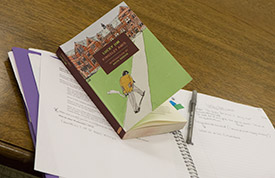In their first semester as Princeton students, 13 freshmen are asking a range of questions in class directly relevant to their new situation: What is the purpose of college? How should they approach their time at Princeton?
The students are enrolled in the freshman seminar "Student Life: The University in Film and Fiction" taught by Sarah Chihaya, an assistant professor of English.
Chihaya said her "big-picture" goal for the seminar is to "ask students what they — and others — really do at a university" and to invite the freshmen to "think about what they plan or hope to do in their four years here."
To spark the conversation, the students are exploring a diverse set of texts about university life, from novels to essays to movies. The reading list is bookended by date — 1920 and 2013 — by two novels with a Princeton connection, "This Side of Paradise" by F. Scott Fitzgerald of the Class of 1917, and "The Accursed" by Joyce Carol Oates, the Roger S. Berlind '52 Professor of the Humanities.
Also on the list are "The Secret History" by Donna Tartt, "On Beauty" by Zadie Smith and "I Am Charlotte Simmons" by Tom Wolfe. Films include "The Graduate," "School Daze," "Berkeley in the Sixties," "The Social Network" and the current film "Dear White People," about which students were asked to write a review.

Freshman Anhar Karim, right, seated next to fellow student Logan Blaine, leads a discussion of the novel "Lucky Jim."
Chihaya, who received her Ph.D. in comparative literature from the University of California-Berkeley in 2013 and is in her second year teaching at Princeton, said she has always been an avid reader of campus fiction. It is, she said, "a compellingly quirky and diverse genre, and I couldn't think of a better way to introduce first-semester freshmen to both the study of literature, and the college experience in general."
Freshman Gabi Agus said, "I love reading fiction, so the campus novels that are the bulk of the curriculum are purely pleasure reading for me."
The material is engaging and thought-provoking, leading students to examine the academic and social environment they have entered. "The books and films have all turned out to be as good as I had hoped, but my favorite thing about the seminar so far has been the way it makes us think critically about the college experience," said Caitlin Quinn.
For engineering student Patrick Boroughs, the subject matter provides academic variety. "It's my only class that's equation-free, and it's nice to get a break from that," he said. "I like being able to talk about university with people in the same position as I am — freshmen who are discovering a new life."
Chihaya added, "This is actually my first all-freshman class at Princeton, and it's been a joy to see my students getting to know this place, and each other."

Students are exploring a diverse set of texts about university life, from novels such as Kingsley Amis' "Lucky Jim" to essays and movies. Chihaya describes campus fiction as a "compellingly quirky and diverse genre."
During a recent class one afternoon in Whitman College, the topic of conversation was the novel "Lucky Jim" by British author Kingsley Amis, published in 1953. From all sides of the room, students participated in a lively discussion about the nature of success and what it means to be "lucky."
Taking his turn to present the day's text, Anhar Karim kicked off the class with the observation that the book's main character, Jim Dixon, a foundering new professor at an obscure English university, was to be "pitied," and that "luck was a major force in the novel."
The students talked about the various antics — comic and chaotic — that embroil Dixon as he heaps one mistake upon the next, and yet ends up with the woman of his dreams as well as a better job, this time outside academia.
"Why at the end of the novel does he get this happy ending?" asked Karim. "Is this book approving of Dixon's behavior?"
"I think it is Amis talking about society and how it is corrupt," said one student.
"It's poking fun at the system in general," added another. "What you need to be good at is manipulating the system to get ahead."
"Because maybe success is not what we should be striving for," said another student.
"What do we think of this idea of striving for something?" asked Chihaya. "Does the novel suggest that there's anything worth striving for?"
Noting that she had also read "Lucky Jim" as an undergraduate, Chihaya said she now sees this more as a book about faculty.
"I always thought that faculty had it all down, knew everything," joked a student.

The freshman seminar provides a close-knit setting for students to discuss candidly what it means to attend university as they prepare to make the most of their time at Princeton.
Next, the students were asked to read two poems by Philip Larkin, a friend of Amis' understood to be the inspiration for "Lucky Jim." Chihaya explained that Larkin's poem "Toads" raises questions about doing "work to succeed" and "work as a burden." The other poem, "This Be the Verse," is one that "makes you laugh and makes you cry," Chihaya said.
The discussion prompted a heartfelt response from one student: "A lot of the reason I came to university is to get a job and money, and a happy life. But which way to go? What is the right way?"
The close-knit class encourages such candor and builds students' confidence in sharing ideas.
"I love how friendly the professor is," said Karim. "I feel like this class, and its seminar style, is an amazing way for me to get adjusted to how Princeton works."







